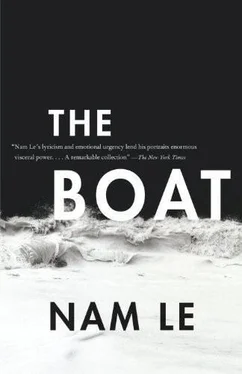"You must miss him," said Mai. "Truong's father."
Quyen nodded.
"When were you married?"
"Nineteen seventy-two," Quyen answered, "in the middle of everything." For a moment her expression emptied out, making her seem younger. "I was your age then."
"Maybe more accidents will happen," Mai said, swallowing quickly through her words, "when you see him again. When we reach land."
Quyen snorted, then started laughing. Her face had recom-posed itself now — was again knowing, shrewd, self-aware. She was pretty when she laughed. "Maybe," she said. She prodded Mai. "And what about you?"
But the mention of land — coming even from her own mouth — canceled out any joke for Mai. She had been trying not to think about it. From every quarter everyone now discussed, obsessively, their situation: they were on a broken-down junk, stranded in the Eastern Sea — here, or maybe here — an easy target for pirates — everyone knew about the pirates, had heard stories of boats being robbed and then rammed, of women being taken, used, dumped. On top of that they were starving, some of them beginning to get sick. No one, however, gave voice to the main fear: that they might not make it.
Mai pushed the dread down. Desperate to change the subject, she said the first thing that came to mind. "Wasn't it dangerous to escape," she asked, "with Truong so young?"
Her laughter subsiding, Quyen settled into a smile. "It was because of him," she said at last, "that I decided to escape." The smile hardened on her mouth.
They both turned toward him again. It had been three days. Watching him — letting in the thought of another day, and after that, another — Mai realized that Quyen's determination, as much as she tried to take part in it, felt increasingly superficial to her. She studied the boy's face. Above his awkward body it remained as stony and impassive as ever.
***
IN RACH GIA, IN THE MILLING MARKET, Mai had been met by a man with a skewed look who talked to a spot behind her shoulder. He called her name by the coriander-selling place. She was waiting for him, her hat on, next to a grease stand, petrols and oils and lubricants spread out like lunch condiments.
"Mai," she heard, "Mai, ha?" and, still sick from the lurching bus trip-it had been her first ride in an automobile-she was swept up by this man who hugged her, turning her this way and that.
"Child has the letter?" he grunted into her ear.
She was confused. He said it again, thrust her out at arm's length and glared straight at her for the first time. She tried hard not to cry.
"Heavens," he said, hastily letting go of her and stepping back. His face spread in an open, unnatural smile before he walked away. All at once Mai remembered her mother's instructions. The folded paper. She ran after him and pressed it into his hand. He read it, furtively, refolded it into a tiny square, and then he was Uncle again.
***
The first hiding place was behind a house by the river. Uncle told her to climb to the top of a plank bed and stay there, don't go anywhere. She lay with the corrugated aluminium roof just a few thumbs above her head, and in the middle of the day the heat was unbearable. The wooden boards beneath her became darkened and tender with her sweat.
A few days later Uncle came to get her — it was after the worst of the afternoon heat — and made her memorize a name and address in Rach Gia in case anyone asked her questions. She felt light-headed standing up.
"When Child reaches land," he told her, "write to Child's mother. She will say what to do next." She nodded dumbly. It was the first and final confirmation of her life's new plan: she was leaving on a boat. He looked at her and sighed. "She said nothing for Child's own protection." He gave her another abbreviated hug. "Does Child understand?" He wasn't, in all likelihood, her real uncle — she knew that now — but still, when he left, she felt in her stomach a deep-seated fluster. It was the last she saw of him.
The second hiding place was a boat anchored beneath a bridge on the Loc Thang river. Mai stayed down below deck for days and days, with sixty people maybe, among cargo sacks of sweet potatoes. No one talked; every sound in the dark was rat-made. She caught herself whimpering and covered her mouth. Once in a while the owner brought a few kilos of rice and they cooked it with potatoes over low kerosene flames and ate, salting their bit, chewing quietly. People coughed into their sleeves to muffle the sound. Parents fed their babies sleeping pills.
One night the owner appeared with another man who came in and tapped her on the shoulder. He tapped five other people as well. They all followed him out of the boat into the hot dark strange openness. A rower waited nearby and after some hesitation and muted dissent they climbed into his canoe, sitting one behind the other, Mai in the middle. The new man — the guide — instructed the rower to cross to the other side of the river. But he didn't, he kept on paddling downstream for what seemed to Mai like hours and hours. At one point she found herself falling asleep. She woke to the sound of wood tapping hollowly against wood. They were pushing into the midst of a dark cluster of houseboats. The rower stopped, secured a lanyard to one of the boats and leapt aboard. He lit a small lantern and began passing large drums reeking of diesel into the canoe. Moments later they moored against the riverbank. The rower crept onshore with a hoe and exhumed something long and gray from beneath a coconut grove.
"Detachable sail," someone whispered.
Mai turned around. The speaker was a young woman. She sounded as though she might have been pointing out bad produce at a market stall.
"It's a detachable sail," the woman repeated.
Mai began asking her what that was when the rower turned, silencing them both with a glare. A moment later Mai felt a cupped hand against her ear.
"My name is Chi Quyen." The woman used the word Chi , for "older sister." She reclined, smiling grimly but not unkindly, then leaned forward again, "Chi too is by herself."
Mai nodded. Shyly, she lifted a finger and crossed her lips.
For a long time they glided soundlessly, close to shore, and then they entered a thick bed of reeds. They stopped. The rower turned around, shook his heavy head and made the sign for no talking. It was dark. He struck a match and lit an incense stick and planted it in the front tip of the canoe. After a while Mai became confused. No one else seemed to be praying. When the stick burned down the guide asked the rower, in a low voice, to light another one. At least an hour passed. Occasionally Mai made out the rower's profile, hard and somber. She took the dark smell of sandalwood into her body.
The canoe swayed. "Maybe they're waiting," a new voice whispered gruffly. "Move out of the reeds so they can see the signal." "Keep your head down!" the rower spat.
At that moment Mai realized the incense stick — its dim glow, its smoke, perhaps — was their signal.
Someone else said, "They won't wait."
"Move out of the reeds," the man repeated.
Mai felt a hot breath in her ear: "If they come, follow Chi, nha? Jump out and swim into the reeds. You can swim, no?"
"If who comes?"
"Fuck your mother, I said keep your head down!"
Someone behind her hissed and the canoe rocked wildly from side to side. The rower whirled around. Then, through the reeds, a light like a car beam flashed on and off. Fumbling, the rower lit a new incense stick, planted it at the canoe tip and paddled, swiftly and silently, back out. They saw it ahead, barely visible in the weird, weakly thrown light from the banks. An old fishing trawler, smaller than she'd imagined — maybe fifteen meters long — sitting low in the water. It inched forward with a diesel growl. A square pilothouse rose up from the foredeck, a large derrick-crane straddling its back deck, and the boat's mid-section congested with short masts and cable rigs. Two big eyes painted on the bow. The canoe drew alongside and three men leaned over the gunwale above them and pulled them up, wrist by wrist. Everyone was aboard within a minute. Before being ushered down the hatch, Mai looked back and saw the canoe, abandoned in the boat's wake, rocking on the dark river.
Читать дальше











